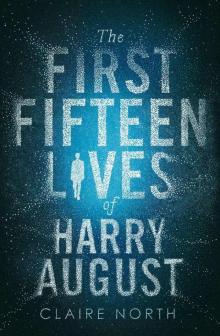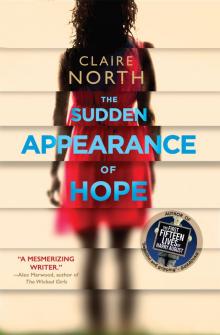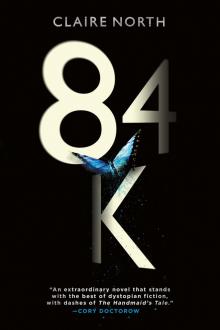- Home
- Claire North
The Sudden Appearance of Hope Page 16
The Sudden Appearance of Hope Read online
Page 16
“If you can’t do anything, why do you read it so much?”
Surprise; the question almost too ridiculous to be asked. “As a warning,” he replied. “To remember. To remember the ones who died, whose killer we never brought to justice.”
Justice: the quality of being just, righteous. The moral principle of determining just conduct.
The administering of deserved punishment or reward.
I thought through my understanding of justice, and found no place for me in it. But then again, to do justice: to act or treat fairly. To acquit in accordance with one’s abilities or potential. It could not be denied that I was unrighteous in my life, but did I do justice?
Then Luca said, “I came here to find a thief.”
My eyes turned back to him from another place. He was the world, the universe, so big in my attention that, for a moment, I wondered if he wasn’t some fractured figment of my own imagination, a voice I had conjured for myself. But his eyes were elsewhere, his words came from some place in his soul that spoke for its own sake, not for mine.
“My superiors think she drowned. She stole from a museum. Forty years ago, the items would have been sold by the Chinese government to raise capital for tractors and shovels, but now China is reacquiring a taste for a glorious and opulent history. This is what gives the item value, more than its chemical composition.”
Emerald: a compound of beryllium aluminium cyclosilicate and trace amounts of chromium, which gives it its green colour.
“I think she came to Hong Kong to sell it. There’s a man, Bogyoke Dennis. He started out as a smuggler in Cambodia; now he kills his enemies with snake venom. He runs the prostitution and people-smuggling racket in the South China Sea. She should never have… but she must have got greedy, or arrogant, or just… stupid.”
Stupid: dull. Lacking quickness.
Stupid, the quality of…
… of being bloody stupid.
Just
stupid.
“You’re… sad, that she’s dead?”
“If she’s dead.”
“But you’re sad.”
He shrugged. “I’m always sad at a loss of human life.”
“Even a thief?”
“Still human.”
“Is that all?”
His eyes refocused onto mine, quick now, sharp, a drawing in of his features. “What do you mean?”
“You sound like you’ve been looking for her for a while.”
“For years. I know every detail of every crime she’s committed. I know how she likes to dress, how she does her hair, what kind of car she likes to drive, what food she eats. In Munich she scammed €75,000 from a lawyer whose speciality was getting drug traffickers off by accusing the police of corruption, and I was… a little bit pleased, God forgive me, but I thought that the crime had humour in it. She skimmed him while he was attending a fundraiser at the opera, scanned his credit cards, cloned his phone, and after she listened to two hours and a quarter of Verdi, I saw her on the security cameras, and again, photographed by one of the journalists there to cover the fundraiser, and she looked… You know, I find it hard to picture her face now, the details are… I know every part of her, but it’s so hard to find… She looked astonished. Held by music. I can’t… I remember thinking that’s how she seemed. I remember thinking those words. Now she’s probably dead; all that for nothing.”
Silence.
Then,
sorry, he said.
Sorry.
Didn’t mean to talk about…
sorry.
Silence.
I reached across the table, my hand on his, and he did not pull away.
I felt the blood in the veins on the top of his hand.
I felt the tendons under his skin.
Was this pulse in my fingertips his heart, or mine?
He looked down, like a man ashamed, and did not pull away.
“I have a terror,” he said at last. “I… fear.”
I waited. All he needed was silence.
“I fear sometimes that… she isn’t real. That she does not exist. It is irrational, of course; we have evidence, DNA, prints, her face, her MO, we have everything we need to convict her. But everywhere we go, every crime she commits, people cannot remember her. Is she a trick, an illusion? A fabrication, a puppet show performed for our delight, a cover for a conspiracy, an experiment, a witch? Why can’t people remember? I can describe her every feature to you and yet… the description is just words, rehearsed for hours on end in briefings – hair, height, weight, colouring – just… words. I look at you and you could be her, you fit the words, but I studied her picture, I know her face, you are not her, I would recognise her, I would know her instantly, I would know!”
Voice rising; pain, fear, confusion.
I pressed my hand tighter against his, my reality, his skin, my warmth, his blood.
“I received a file,” he went on. “I thought perhaps it was from her. How did she know about me? Perhaps she had it ready to send, in case the exchange went wrong. Perhaps she is using me from beyond the grave, vengeance against the men who killed her.”
“There’d be some justice in that, I think.”
The slightest of smiles. “Yes,” he conceded. “Perhaps a little.”
Justice. In Chinese the symbol is , yí, a pictogram I always thought looked rather joyous, full of hope. If I were to sign my name with a symbol, I think I would want it to be .
“Just because no one remembers seeing her doesn’t mean she died,” I said, and as he smiled at nothing, I added, “It seems like an extraordinary series of events.”
He looked at me again, or perhaps for the first time, and I wondered if now he was listing words that matched my features. My height, weight, skin, eyes, the slightly bulbous end of my nose, ears a little too large, high forehead, thick brows, deep black hair pulled back into a loose knot, a suggestion of freckles under my eyes. All these things could be described, annotated, he could stand in front of my photo every day and recite these qualities, and now he looked at me and perhaps, for the first time, attempted to annotate my face, categorise it and find a match. Did he see who I was?
Perhaps he did.
But he believed too much in his own rationality, and so at the very moment that his eyes widened and his lips parted in realisation, he turned his head to one side, pulled his gaze away, and informed himself perhaps that no, no – he knew the face of the thief, it was impossible to meet her now and not recognise her, not him, not after all this time.
And so the moment passed, leaving only him, me, now.
I said, “Do you want another drink?”
He shouldn’t.
He was… it wasn’t… he wasn’t that kinda guy.
“I was alone last night, I’ll be alone tomorrow,” I replied. “How about you?”
His hand, still beneath mine.
“Okay,” he said. Then, “Okay.”
Chapter 41
Forget to count.
Forget to remember.
I have forgotten my age; every document with my face is a lie.
I have forgotten my friends, as they forgot me.
I have forgotten the turn of the years, for what are they to me?
The years will not remember me.
My face fades from the minds of men.
Only my deeds remain.
Chapter 42
On his seventh day in Tokyo, I followed Rafe Pereyra-Conroy to a sumo match.
Traditional arts in Japan: sumo, karate, kendo, judo, kyudo, kabuki, origami, flower arrangement.
Hierarchy. A sumo stable is organised with military discipline. At the bottom are the jonokushi, then makushika and juryo. Only forty-two elite makuuchi exist at any time, their matches broadcast on television, life expectancy at least ten years lower than the national average.
Nomi No Sukuni, Shinto god of sumo. Once upon a time, the wrestlers performed their rites on temple grounds, to ensure good harvest, and the referees still
made the dohyo sacred with sprinkled salt.
Did Rafe care, as he took a seat in a private area of cushions and clean tatami mats right by the ring? Probably not. I watched him through a small pair of binoculars from a wooden bench high in the auditorium. He was a foreign dignitary being taken to sumo to entertain and enthral, to have an anecdote to tell his friends when he returned home. I saw a sumo match, yes, yes I did; understand it? No, of course not, but I was there, I’ve experienced Japan now, yes, oh yes I have.
In the reception afterwards, I listened to the chatter as I circled the room.
I was getting better at recognising those who had Perfection.
She: her perfect teeth, her perfect hair, her perfect smile, her perfect clothes, fashionably chosen, gracefully worn.
He: silk and cotton, the white of his shirt sharp as thorns, the perfect drink in his hand, the perfect woman on his arm.
Do you have Perfection?
(“Oh my,” said the woman with the surgery-enhanced waist. “It’s changed my life.”)
(“It’s not just about looking after myself,” added the man whose champagne I refilled. “It’s about meeting people like me. The best of the best.”)
A polite smattering of applause, a man dressed in full Shinto robes, oranges and yellows, a high black lacquered hat, stood on the dais and in formal, steady Japanese thanked everyone for attending.
“In the way of the gods,” his translator limped through the words, “we seek to purify ourselves from unclean rituals and sins. We wash away sinful thought, unclean practice, guilty deeds, and emerge radiant at last. Every child who is born in Japan, regardless of their creed, is welcomed into the shrine and made a family child, their name given to the spirits for blessing and protection. It is in this spirit – welcoming, and purification – that I am proud to call Mr Pereyra-Conroy a friend, and say that the work he does in Japan helps men and women in their souls.”
First Dubai, now Tokyo. Rafe was a busy bee.
“Perfection,” he continued, after the pause, “makes people better.”
Turning to walk away, and there she was, Filipa Pereyra-Conroy, dressed in black, a glass in one hand, nails trimmed short, hair tied high. She stood in my path and said, “Hello. I saw you alone. Do you know anyone here?”
Not accusatory, not angry; a woman who has seen a stranger and wonders if she needs company.
Just like Dubai.
“Hello,” I replied, offering my hand. “My name is Hope.”
“Filipa.”
“I know; I’ve studied your work, Dr Pereyra.”
A flicker of an eyebrow, a nervous tug at the end of her sleeve.
“Have you? I didn’t think… What aspect of it?”
“I read your paper on cognitive reconstruction and reinforcement. Very interesting, even to an outsider.”
“Are you an outsider?”
“I read, for company.”
A smile, sudden, strong, that flashed away as quickly as it had come, locked down beneath manner and etiquette. “So do I.”
“I understand you’re working on treatments?”
Too fast, too much prodding for information, suspicion, a slight angling of her body. It’s fine: if this should occur, I will walk away, do a lap of the room, return to her side, try again, build a little more trust. This is an opportunity too good to miss.
The index finger of her left hand tapped a few times against the top of her glass, and I doubted she noticed. “Do you have Perfection?” she asked at last.
“Yes.”
“Are you…”
“With the 106 Club? Yes.”
“Then you’ll know about treatments already.”
“Not yet; I haven’t had an appointment. I’ve been very busy recently – family.”
“Family is important.”
A mantra, recited, and she does not look at her brother as she speaks, does not express her words with her body, but stands stiff, upright, watching. I move on quickly, and she is happy to be moved.
“Can I ask: where did the idea for Perfection come from?”
Her eyes, lifting a little, head up, chin out. “What can you mean?”
“I mean… what inspired you?”
Silence a while. Then, “My brother. He is… as a child, I thought he was… our father very much loved him, you see, and he always thought the world could benefit from something of his… quality.”
Sadness. She smiles, she is still and straight, but these were not the flowing words of the woman I’d met in Dubai; this was hurt, and justification, and hollow gaps where truth should be. To my surprise I found myself wanting to touch her, and tightened my grip on my glass.
“All thought is feedback,” I said at last, and now her eyes were fixed on me, through me, I had her full attention, so intense I wondered if she would ever forget me, if she could ever forget this moment. “Faced with mounting stress, the body enters an alarmed state. Capillaries dilate, heart beats faster, breathing increases, skin flushes, muscles tense. With each social rejection, pathways are reinforced in the brain which links social rejection with physiological anxiety. Thus reinforced, you are more likely to experience a physical reaction to even slight social discomfort, thus making you more uncomfortable, thus reinforcing the physical and so on and so on. All thought is feedback: sometimes that feedback can be too loud. That’s what I think, anyway.”
Silence a while.
Her body seemed to uncoil, shoulders releasing from their stiff posture, knees softening, face softening, eyes softening. For the first time she seemed to see the room, see the party, a swaying, laughing, tinkling mass of perfect people with perfect smiles.
“You aren’t in the 106,” she said simply.
“Why do you say that?” I asked.
“Because you’re not perfect.”
“What does ‘perfect’ mean?”
She smiled, arms folded, head to one side. “If you were in the 106, you wouldn’t ask. Perfection is you, and you are perfection; that is the truth of it.”
“And you don’t have Perfection either,” I replied. “I can see it too.”
Her eyes flickered round the room, caught her brother for a moment, half bowing, shaking hands, all smiles, charm, beauty. Her gaze returned to me, and for a moment, I thought she might cry.
“Have you eaten?” she asked. “I’m starving.”
We ate noodles. She ordered spicy Singapore style, I had udon in soup, and she tried a spoonful of the broth, slurping from the shallow wooden spoon.
“The party, won’t your brother be…”
“He won’t care.”
“You sure?”
“It’s one of the things Rafe shares with my father – a single-minded commitment to an ideology. The rest is noise.”
“What ideology is that?”
“Victory.”
“Is that an ideology?”
“I think so. Rafe hides it better than Dad did. Dad was always proving something, that he was better, smarter than everyone else; but Rafe has to prove that he’s better than Dad.”
My eyebrows must have risen, because hers did in reply, mirroring, and she asked, a little too high, “What’s the matter?”
“This seems like something you wouldn’t tell a stranger.”
“I’m sorry, I’ve made you… I’m not very good at meeting new people, you see.”
“You seem to be very good.”
“No,” she replied, a little sadly. “I’m not. Rafe drags me along to all his parties, his big launch events, points at me and says, ‘There’s the head of development, my sister’ and everyone smiles at me and shakes my hand and then he keeps on talking, in case I speak.”
“You spoke to me.”
“You were alone. You were imperfect.”
“Is that all it took?”
“You… know something of my field. I can talk to people at work but they don’t really get it, not really, but you were alone and imperfect, and you thought about thought, about what thinkin
g means, about minds and people and… Are you a journalist?” The words came fast and sudden, an almost physical jerking back of her body at the idea.
“No. I’m not. I’m writing a paper on Perfection.”
Her eyebrows flickered upwards, sharp, an attention fully honed. “What body?”
“Oxford, St John’s.”
“You know Professor Vikkendar?”
“No. I’m in anthropology.”
A little nod, her interest diverted almost instantly; humanities bore her, but I pushed on. “I’m interested in the definition of ‘perfect’ over time, and the construction of the self. Perfection is becoming a movement, a global redefinition—”
“No it’s not. That’s not the point.”
I bit my bottom lip, chose my words slowly. “Maybe that’s not the point for you, Dr Pereyra,” I mused, “but that’s what it is becoming.”
“The point is thought. Patterns of behaviour, patterns of thinking, breaking boundaries, creating new pathways – I’m sorry, I thought you understood this, when you said—”
“Perhaps we should be clear – there is the science, and there is the product. I’m talking about the product.”
“Oh.” Her interest almost gone now, the noodles growing cold in front of her. “I don’t really deal with that.”
Silence, suddenly awkward, a hard fall from the place we’d begun. I looked round, my gaze briefly meeting the eyes of one of the two security men who shadowed Filipa to the restaurant. One stood by the door, one was in a booth a few rows behind, keeping a polite distance.

 Gamehouse 01 - The Serpent
Gamehouse 01 - The Serpent The Master
The Master Gamehouse 03 - The Master
Gamehouse 03 - The Master The Thief
The Thief The First Fifteen Lives of Harry August
The First Fifteen Lives of Harry August The Serpent
The Serpent The Sudden Appearance of Hope
The Sudden Appearance of Hope The Pursuit of William Abbey
The Pursuit of William Abbey 84k
84k The Gameshouse
The Gameshouse Touch
Touch Sweet Harmony
Sweet Harmony The End of the Day
The End of the Day Notes from the Burning Age
Notes from the Burning Age